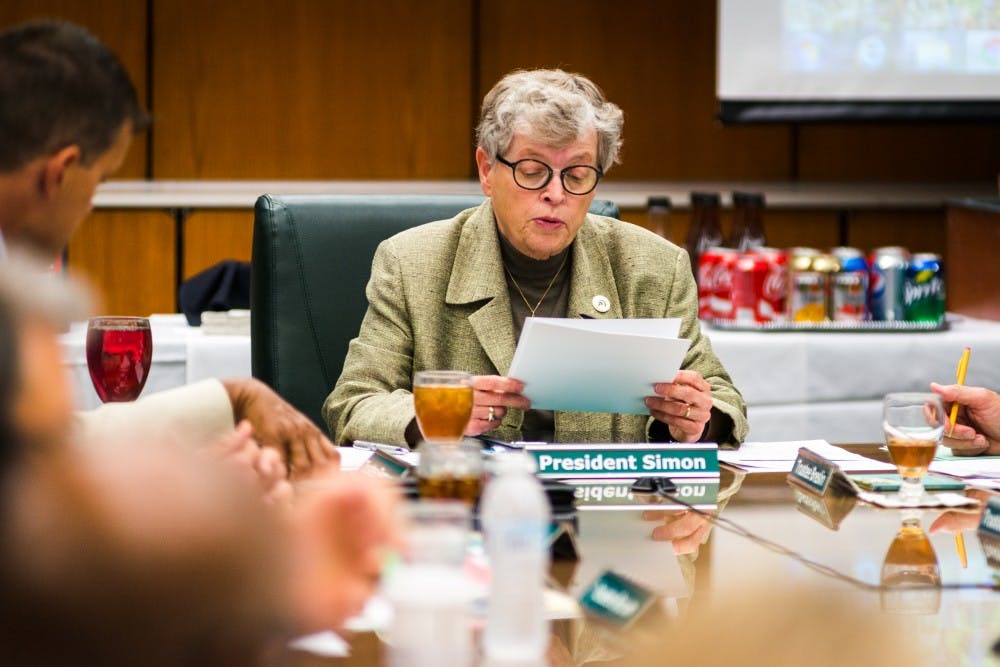While most students were away, MSU's Board of Trustees continued to meet throughout the summer to make decisions about student tuition, the university's budget and more. Here's what you might have missed from the trustees during the summer.
MSU raised tuition for 2017-18
The trustees raised tuition by an average of 3.3 percent for in-state students for the 2017-18 year. It marked the eighth consecutive tuition increase.
In-state freshmen and sophomores will see a 2.8 percent increase in tuition for the upcoming year and a cost per credit hour increase of $13.25.
In-state juniors and seniors will see a 3.8 percent increase in tuition for the upcoming year and a cost per credit hour increase of $19.75.
Out-of-state undergraduates will see a 4 percent tuition increase, which means out-of-state freshmen and sophomores will pay $50.50 more per credit hour and out-of-state juniors and seniors will pay $52 more per credit hour.
Both in-state and out-of state graduate students will both see a 4 percent increase in tuition.
In-state graduate students will pay $28 more per credit hour and out-of-state graduate students will pay $55 more per credit hour.
MSU introduced a new "Go Green, Go 15" plan
MSU announced a new initiative titled "Go Green, Go 15." Recently launched as part of MSU's Student Success Initiative, it encourages MSU students to aim for an average of 15 credits per semester and to complete 30 credits in their first year of study.
The purpose is to push students to reduce college costs in the long run and to allow for more flexibility when it comes to studying abroad, dropping classes and taking internships.
According to the Go Green, Go 15 website, a majority of students taking 15 credits per semester earn higher GPA's and taking 15 credits per semester will reduce college costs by up to $50,000.
As part of the initiative, a tuition freeze is proposed for incoming fall 2018 freshmen. If the trustees vote it into effect next summer, tuition rates will freeze at 2017-18 rates so long as the incoming freshmen take 15 credits for the semester.
The plan does not serve to rival the University of Michigan's recently announced "Go Blue Guarantee."
Students are currently considered full-time students if they take a minimum of 12 credits per semester.
MSU released the Jones Day investigation findings
After a briefing from Athletic Director Mark Hollis and MSU head football coach Mark Dantonio in a closed work session, MSU released the findings from the Jones Day independent investigation of the football program.
The Jones Day law firm found senior football program members to be in compliance with the university's relationship violence and sexual misconduct policy following allegations of criminal sexual conduct stemming from an incident in January.
MSU trustees announced the findings of the investigation, which showed football program and athletic department leaders promptly and accurately reported any information that came their way concerning the January incident. The investigation also found no evidence that employees attempted to cover up or obstruct the Title IX investigation into the incident.
The three football players accused of the alleged sexual assault were unnamed at the time, but have since been identified and dismissed from the football team and the university itself.
Support student media!
Please consider donating to The State News and help fund the future of journalism.
Trustee Mitch Lyons faced criticism
Trustee Mitch Lyons said he "deeply regrets" naming ex-MSU football player Auston Robertson as the student-athlete who reported alleged sexual assaults to head coach Mark Dantonio after facing criticism from fellow trustees.
Lyons had told Grand Rapids WBBL 107.3 FM that Robertson was the unnamed player who told Dantonio of the alleged sexual assault involving three other members of the football program, which led Dantonio to report it to MSU's Title IX office.
Following this interview, Lyons publicly said he "misspoke" and "confused the cases." Lyons revoked his statement.
During the June Board of Trustees meeting, trustees Brian Mosallam and Dianne Byrum as well as Associated Students of Michigan State University President Lorenzo Santavicca criticized Lyons for naming Robertson to the media.
Donation of a TV license didn't pan out
The MSU Board of Trustees held a special meeting in July to grant President Lou Anna K. Simon authority to deal with negotiations of a TV broadcast license donation. However, shortly after the meeting, it was determined the donation would not happen.
Before the cease of negotiations, it was a possibility that WHTV might donate its "nomad license" - its authorization to operate a TV station, but no spectrum on which to operate it — to WKAR-TV by way of MSU.
WHTV is a commercial TV station in Lansing licensed to Spartan-TV, LLC and affiliated with MY Network TV, according to the memorandum used during the brief July meeting. As of the meeting, MSU didn't have a plan as to how it might use the license.
The donation of the TV license didn't pan out in the end.
"There were some regulatory issues that as we continued to work with the donor, both sides realized it just wasn't going to work going forward," MSU spokesperson Jason Cody said. "We appreciate the donor thinking of us, and at this point, this specific donation is not going to go forward."
University budget highlights
The 2017-18 budget shows a 2.5 percent general salary increase for faculty and non-unionized staff based on merit and a 0.5 percent increase for market adjustments.
$7.5 million will be allotted for academic competitiveness, student success analytics, campus Wi-Fi improvements, information technology and other initiatives.
With the move from coal to natural gas use at the T.B. Simon Power Plant, there was a 7 percent decrease in utility costs, which amounted to $4.2 million.
This story appears in The State News 2017 Welcome Week Edition. The issue can be found on MSU's campus at various dorms and buildings. To read other Welcome Week stories, click here.
Discussion
Share and discuss “Board of Trustees: rising tuition and what else you might have missed this summer” on social media.








